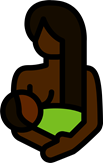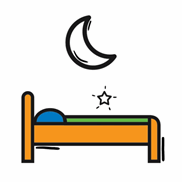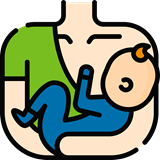One of the most common questions about breastfeeding is:
"How do I know if my baby is getting enough milk?"
It may take a little while before you feel confident your baby is getting what they need. There are some signs you can see in your baby to reassure you they are getting enough:
 Wet and dirty nappies
Wet and dirty nappiesThe Importance of Feeding at Night
Feeding your baby in the evening and through the night is  very important. This is when your body will produce the most milk, making hormones to help you keep up with your baby's demands during the next 24 hours.
very important. This is when your body will produce the most milk, making hormones to help you keep up with your baby's demands during the next 24 hours.
This is why babies often cluster feed (feeding very very frequently) all evening and wake often in the night to feed. It is nature's way of making sure you have enough milk for them.
Some parents will make the choice to substitute a breastfeed with an expressed or formula milk feed in a cup or bottle. This is best done at the same time every day so that milk production is not affected.
Perhaps ask a partner, family member or friend to give this feed when they return from work if you have chosen to do this. You can then rest and prepare for the evening and night feeding ahead.
You may be worried that you are not producing enough milk and there are ways that you can boost your milk supply if this is the case.
 Ask your midwife, health visitor or breastfeeding specialist to watch your baby feeding. They can offer guidance and support to help your baby get the correct attachment.
Ask your midwife, health visitor or breastfeeding specialist to watch your baby feeding. They can offer guidance and support to help your baby get the correct attachment.You may see foods and drinks advertised that claim to boost your milk supply but these are not recommended, are often expensive and not proven to work.
Things That Can Affect Your Milk Supply
The more your baby feeds, the more breast milk you'll produce. However, if you're worried that your baby isn't getting enough milk, talk to your midwife, health visitor, Just One Number or a breastfeeding specialist as soon as possible.
Things that can affect your milk supply include:
Breastfeeding Assessment Form
A breastfeeding assessment form is something that you, or a health practitioner working with your family can use to identify if your baby is feeding well.
How Lactation Works
If your baby is less than 28 days old you can contact your local midwifery team or you can contact the Healthy Child Programme at any time following your baby's birth by calling Just One Number on 0300 300 0123 or texting Parentline on 07520 631590.
Our opening hours are 8am-6pm Monday to Friday (excluding bank holidays) and 9am-1pm on Saturdays.
Norfolk Healthy Child Programme has a team of infant feeding champions who can contact you by video call/telephone initially to discuss your questions and refer you to further help if required. All of our staff are trained to Unicef standards to provide you with the best possible breastfeeding support and advice.
It may help in the first instance to look again at our page on Positioning and Attachment or read the Essential Guide to Feeding & Caring for your Baby.
Norfolk’s Early Childhood and Family Service (ECFS) offers support for all parents and carers with children aged 0 to 5 years.
To speak to other Norfolk parents and carers, you can join our online community forum below.
Also in this section...